
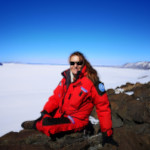 Laura Selbmann, MSc in Biological Sciences, PhD in Biological Evolution and Biochemistry, Associate Professor at the University of Tuscia, Viterbo. Regular guest at the Westerdijk Institute, The Netherlands from 2004 to 2010. Member of the Life Science Group of the Scientific Committee for Research in Antarctica (SCAR) since 2021. Member of MIRRI-Italia (Microbial Resource Research Infrastructure) since 2019. Since 2009 Scientific Director of the Italian National Museum of Antarctica (MNA), Mycological Section, Genoa, Italy. Her main field of study concerns microorganisms from extreme environments and in particular fungi, coordinator of many national and international projects (PNRA, PRIN, ASI, JGI, EMSL). He has participated in 4 Italian Antarctic expeditions (2010-11, 2015-16, 2018-19 and 2021-22), both at the "Mario Zucchelli" Station and the US "McMurdo" Station. He has dedicated his professional life to the study of Antarctic microbial cryptoendolithic communities to investigate their evolution and adaptation during extremes and explore them as early warning systems to monitor the effect of climate change. To date he has described more than 20 new fungal genera and more than 50 new fungal species, most of which from Antarctica. He has published > 140 articles and 4 book chapters. H index 41 Scopus; >8k citations.
Laura Selbmann, MSc in Biological Sciences, PhD in Biological Evolution and Biochemistry, Associate Professor at the University of Tuscia, Viterbo. Regular guest at the Westerdijk Institute, The Netherlands from 2004 to 2010. Member of the Life Science Group of the Scientific Committee for Research in Antarctica (SCAR) since 2021. Member of MIRRI-Italia (Microbial Resource Research Infrastructure) since 2019. Since 2009 Scientific Director of the Italian National Museum of Antarctica (MNA), Mycological Section, Genoa, Italy. Her main field of study concerns microorganisms from extreme environments and in particular fungi, coordinator of many national and international projects (PNRA, PRIN, ASI, JGI, EMSL). He has participated in 4 Italian Antarctic expeditions (2010-11, 2015-16, 2018-19 and 2021-22), both at the "Mario Zucchelli" Station and the US "McMurdo" Station. He has dedicated his professional life to the study of Antarctic microbial cryptoendolithic communities to investigate their evolution and adaptation during extremes and explore them as early warning systems to monitor the effect of climate change. To date he has described more than 20 new fungal genera and more than 50 new fungal species, most of which from Antarctica. He has published > 140 articles and 4 book chapters. H index 41 Scopus; >8k citations.
Google scholar
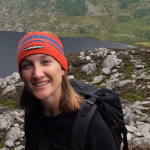 After receiving her Bachelor's degree in Geology from the University of Trieste and her Master's degree in Atmospheric Sciences from the University of Innsbruck, she completed a PhD in palaeoclimate modelling at the University of Trieste and the Abdus Salam International Center for Theoretical Physics (ICTP). She has since conducted research at ICTP, CNR-ISP, and the University of Quebec in Montreal, focusing on climate-cryosphere interactions in the Alps and the Arctic, spanning from the Last Glacial Maximum (LGM) to future scenarios. She has participated in several scientific expeditions in the Himalayas, Greenland, and the Central-Eastern Alps and is actively engaged in outreach activities
After receiving her Bachelor's degree in Geology from the University of Trieste and her Master's degree in Atmospheric Sciences from the University of Innsbruck, she completed a PhD in palaeoclimate modelling at the University of Trieste and the Abdus Salam International Center for Theoretical Physics (ICTP). She has since conducted research at ICTP, CNR-ISP, and the University of Quebec in Montreal, focusing on climate-cryosphere interactions in the Alps and the Arctic, spanning from the Last Glacial Maximum (LGM) to future scenarios. She has participated in several scientific expeditions in the Himalayas, Greenland, and the Central-Eastern Alps and is actively engaged in outreach activities
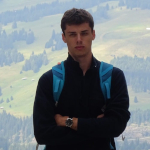 Graduated in Environmental Science and Technology from the University of Bicocca in 2023. The thesis focused on characterizing the carbonaceous and mineral content of Light Absorbing Particles deposited on the snow surface of the Shallap Glacier (Peru), including a modeling study based on back-trajectory analysis. Currently a Ph.D. student in Polar Sciences at Ca' Foscari University since December 2023, in collaboration with the Institute of Polar Sciences in Milan and Venice. The research aims to study the impact of biomass burning emissions and dust uplift on the Arctic atmosphere by analyzing the composition and the optical and microphysical properties of aerosols, integrating this information with the study of their source areas.
Graduated in Environmental Science and Technology from the University of Bicocca in 2023. The thesis focused on characterizing the carbonaceous and mineral content of Light Absorbing Particles deposited on the snow surface of the Shallap Glacier (Peru), including a modeling study based on back-trajectory analysis. Currently a Ph.D. student in Polar Sciences at Ca' Foscari University since December 2023, in collaboration with the Institute of Polar Sciences in Milan and Venice. The research aims to study the impact of biomass burning emissions and dust uplift on the Arctic atmosphere by analyzing the composition and the optical and microphysical properties of aerosols, integrating this information with the study of their source areas.
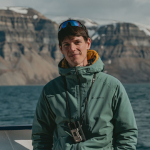 Graduated in Chemistry in 2023 at the University of Bologna with a thesis on the chemical characterization, by means of 1H-NMR spectroscopy, of the organic aerosol sampled in Ny-Ålesund.
Graduated in Chemistry in 2023 at the University of Bologna with a thesis on the chemical characterization, by means of 1H-NMR spectroscopy, of the organic aerosol sampled in Ny-Ålesund.
Since December 2023 PhD student in Polar Sciences at the Ca' Foscari University of Venice. The research, conducted in conjunction with the Institute of Polar Sciences on the Milan and Venice campuses, aims to improve the knowledge of aerosol-cloud interactions in the Arctic climate system. The microphysical and chemical properties of atmospheric particulate matter are investigated in detail to assess particles' ability to act as cloud condensation nuclei (CCN) and ice nuclei (IN).
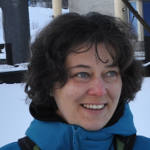 She is a senior researcher and assistant Professor at the Department of Physical, Earth and Environmental Sciences (DSFTA) of the University of Siena (Italy) since 1 November 2001. She is currently a lecturer in the following courses: Ecotoxicology of Remote Areas (Master's Degree); Marine Ecology (Bachelor's Degree). She is responsible for the Curriculum in Biology, Ecology, Biodiversity of the PhD of National Interest in Polar Sciences (Ca' Foscari University of Venice); she is a member of the Board of Professors of the PhD in Environmental, Geological and Polar Sciences and Technologies.
She is a senior researcher and assistant Professor at the Department of Physical, Earth and Environmental Sciences (DSFTA) of the University of Siena (Italy) since 1 November 2001. She is currently a lecturer in the following courses: Ecotoxicology of Remote Areas (Master's Degree); Marine Ecology (Bachelor's Degree). She is responsible for the Curriculum in Biology, Ecology, Biodiversity of the PhD of National Interest in Polar Sciences (Ca' Foscari University of Venice); she is a member of the Board of Professors of the PhD in Environmental, Geological and Polar Sciences and Technologies.
She collaborates with colleagues from Italian and foreign universities/research institutions. Since 1994 she works in the Italian National Antarctic Research Programme (PNRA) and has participated in seven Antarctic Expeditions. She is part of the international program TUNU-Programme: Euro-Arctic Marine Fishes—Diversity and Adaptation, coordinated by UiT The Arctic University of Norway in Tromsø, participating in six expeditions in the Arctic; in this programme she has studied the ecotoxicology of the Greenland shark (Somniosus microcephalus). She is president of the Action Group "Input Pathways of Persistent Organic Pollutants to Antarctica, ImPACT" of the Scientific Committee on Antarctic Research (SCAR). Since 2019 she has been a member of the Expert Group on POPs of the Arctic Monitoring and Assessment Programme (AMAP). She is P.I. of the Laboratory of Ecotoxicology and Remote Areas (ERRe LAB) of the DSFTA.
The main research interests include the ecotoxicology of persistent organic pollutants (POPs) in the Polar Regions, and marine ecology. In particular: study of POPs and emerging contaminants under climate-driven changes; POP fluxes between abiotic and biotic ecosystem compartments and from tissue to community levels; bioaccumulation in predators and trophic webs; risk assessment (TEQ); POPs in food and human risk (TWI, EDI); ecology of seabirds (1994-2005).
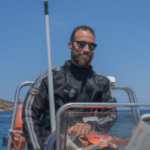 In 2017, he earned a PhD in Environmental and Evolutionary Biology, specializing in Ecological Sciences. Currently, he is a Researcher at the Department of Environmental Biology of Sapienza University of Rome. His primary research interests encompass the ecology of benthic communities, the impacts of human activities and climate change on marine ecosystems, as well as ecological restoration. Specifically, his work focuses on:
In 2017, he earned a PhD in Environmental and Evolutionary Biology, specializing in Ecological Sciences. Currently, he is a Researcher at the Department of Environmental Biology of Sapienza University of Rome. His primary research interests encompass the ecology of benthic communities, the impacts of human activities and climate change on marine ecosystems, as well as ecological restoration. Specifically, his work focuses on:
• assessing the distribution, composition, structure, and health status of Mediterranean benthic communities of conservation interest;
• studying and defining the processes of bioconstruction and bioerosion on natural and anthropic substrates, especially concerning submerged archaeological finds;
• evaluating the effects of human disturbance, heat waves, and ocean acidification on benthic communities, with particular attention to the quantification of resistance and recovery processes;
• defining methods for the active and passive restoration of marine ecosystems and new tools useful for evaluating their effects in terms of recovery and state of health.
Since 2015, he has worked as a Scientific Diver and, since 2018, he has also been teaching at the Scientific Diving Summer School in collaboration with researchers from OGS and the University of Genoa.
He has authored or co-authored over 30 indexed papers (SCOPUS) published in international journals.
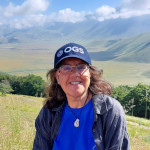 She graduated in Biological Sciences from the University of Siena in 1977, and worked as a research biologist and marine ecologist at the Anton Dohrn Zoological Station in Naples, at the current Ischia Marine Center, from 1983 to 2021, coordinating the Ischia team for some periods. Since 2021 she has been an associated researcher at the National Institute of Oceanography and Experimental Geophysics - OGS in Trieste, she is also associated with ISPRA-Rome (September 2023) and the Polar Scientific Institute of the CNR in Messina (May 2024). She has worked in the field of ecology of benthic biota, and coastal benthic ecosystems, with particular focus on the taxonomy and ecology of polychaete marine worms, and the ecology of seagrass systems, especially Posidonia oceanica. She has also worked in coastal polar environments, participating between 1989 and 2006 in 6 oceanographic expeditions to Antarctica and sub-Antarctica within the PNRA and the German and Spanish programmes, coordinating the research group of the SZN team in Ischia. For over 20 years she has been studying the effects of climate change on the benthos, in relation to both the increase in temperature (heat waves, alien species) and ocean acidification. In this later topic she is studying the ecology and eco-physiology of the benthic biota, including seagrasses, which live in particular coastal hydrothermal systems characterized by CO2 emissions from the seabed (vents) and natural acidification of the waters both at Ischia and in the Aeolian islands. She has supervised approximately 36 master's theses, 11 PhDs and 4 post-docs. She has served as Editor-in-Chief of the Journal Marine Ecology (Wiley; 2005-2013) and has published over 300 scientific papers and 4 books. Passionate about classical and popular music, she completed regular flute studies at the R. Franci music school of Siena.
She graduated in Biological Sciences from the University of Siena in 1977, and worked as a research biologist and marine ecologist at the Anton Dohrn Zoological Station in Naples, at the current Ischia Marine Center, from 1983 to 2021, coordinating the Ischia team for some periods. Since 2021 she has been an associated researcher at the National Institute of Oceanography and Experimental Geophysics - OGS in Trieste, she is also associated with ISPRA-Rome (September 2023) and the Polar Scientific Institute of the CNR in Messina (May 2024). She has worked in the field of ecology of benthic biota, and coastal benthic ecosystems, with particular focus on the taxonomy and ecology of polychaete marine worms, and the ecology of seagrass systems, especially Posidonia oceanica. She has also worked in coastal polar environments, participating between 1989 and 2006 in 6 oceanographic expeditions to Antarctica and sub-Antarctica within the PNRA and the German and Spanish programmes, coordinating the research group of the SZN team in Ischia. For over 20 years she has been studying the effects of climate change on the benthos, in relation to both the increase in temperature (heat waves, alien species) and ocean acidification. In this later topic she is studying the ecology and eco-physiology of the benthic biota, including seagrasses, which live in particular coastal hydrothermal systems characterized by CO2 emissions from the seabed (vents) and natural acidification of the waters both at Ischia and in the Aeolian islands. She has supervised approximately 36 master's theses, 11 PhDs and 4 post-docs. She has served as Editor-in-Chief of the Journal Marine Ecology (Wiley; 2005-2013) and has published over 300 scientific papers and 4 books. Passionate about classical and popular music, she completed regular flute studies at the R. Franci music school of Siena.
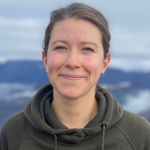 Graduated in Sciences and Technologies for Environment and Landscape at the University of Milano Bicocca, I am currently a PhD candidate in Polar Sciences at Ca' Foscari University of Venice. My research project focuses on water isotopes analysis of surface snow and Antarctic ice cores for reconstructing past temperatures. I have collaborated with CNR-ISP in Venice on developing Continuous Flow Analysis coupled with Cavity Ring Down Spectrometer system for continuous chemical and isotopic analysis. Additionally, I have contributed to instrument management and maintenance at the Dirigibile Italia station in Svalbard (Ny-Ålesund) during the winter season, and participated in the Ice Memory project by analyzing an alpine ice core. Currently, I am affiliated with CNR-ISP for cutting the Antarctic ice core retrieved from Little Dome C through the Beyond EPICA project.
Graduated in Sciences and Technologies for Environment and Landscape at the University of Milano Bicocca, I am currently a PhD candidate in Polar Sciences at Ca' Foscari University of Venice. My research project focuses on water isotopes analysis of surface snow and Antarctic ice cores for reconstructing past temperatures. I have collaborated with CNR-ISP in Venice on developing Continuous Flow Analysis coupled with Cavity Ring Down Spectrometer system for continuous chemical and isotopic analysis. Additionally, I have contributed to instrument management and maintenance at the Dirigibile Italia station in Svalbard (Ny-Ålesund) during the winter season, and participated in the Ice Memory project by analyzing an alpine ice core. Currently, I am affiliated with CNR-ISP for cutting the Antarctic ice core retrieved from Little Dome C through the Beyond EPICA project.
 PhD student in Polar Sciences at Ca' Foscari University of Venice, where he previously obtained a Master's Degree in Environmental Sciences. His research project aims to understand if in the recent period Svalbard has really changed their climatic regime defining the potential associated consequences.
PhD student in Polar Sciences at Ca' Foscari University of Venice, where he previously obtained a Master's Degree in Environmental Sciences. His research project aims to understand if in the recent period Svalbard has really changed their climatic regime defining the potential associated consequences.
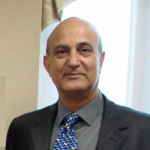 Since 1990 he is full professor of Ecology at the Faculty of Science of the University of Messina (Italy). General Secretary in the following NATO courses coordinated by Dr Trevor Platt, Halifax, Canada: (a) Lipari Island, Italy (12-24 October 1980) on Physiological ecology of Phytoplankton, (b) Bombannes (Bordeaux, France 12-20 May 1982) on Flows of energy and materials in marine ecosyistems: theory and practice, (c) S. Miniato, Italy (1-7 October 1985) on Physiological Ecology of photosynthetic Picopl9ankton in the Ocean. From 1990 to 2002, Italian Delegate to the Scientific Commission of the CCAMLR (Commission for the Conservation of Antarctic Marine Living Resources, Hobart (Tasmania, Australia). Over 60 months accumulated research experience at sea, including the following PNRA Italian Antarctic Expeditions as Principal Investigator: III Exp. (Terra Nova Bay Ecosystem,1987-88), V (South Pacific Sector,1989-90), X ROSSMIZE (Ross Sea Marginal Ice Zone Ecology,1994-95), XIII PIPEX (Pack Ice Plankton Expedition,1997-98), XV PIED (Pack Ice Ecosystem Dynamics 1999-2000), XX SEAROWS (Sea ice Ecology in the Antarctic: ROss and Weddell Seas) on the Polar Queen, Cariboo, Italica (1987-2002), Peri-Antarctic Oceanographic Expeditions in the Strait of Magellan I (1991) and II (1995), and one Arctic canadian cruise by N/R Hudson (1980). He has been Scientific Responsible of the Operative Unit Zooplankton and Micronekton in the following European projects: VECTOR, RITMARE, COCONET, MARINE STRATEGY. From 1968 to now, his research activity has been continuously addressed to issues on the zooplankton and micronekton ecology and biodiversity. Its main fields of study concern: (a) spatio-temporal distribution and daily vertical migrations (DVM) of marine zooplankton and micronekton communities in the Mediterranean and Polar ecosystems, in relation to the physical, chemical and biological water mass structure) (b) brackish environments functioning and biological response to stressor variables, (c) functioning of the coastal and pelagic food chain, with particular regard to the role of euphausiid and mesopelagic fish in the Deep Scattering Layer (DSL) (d) zooplankton role in the carbon cycle, (e) particles size spectrum (OPC) in the study of aquatic ecosystems (f) effects of climate change on the biology and ecology of Antarctic sea-ice and free water zooplankton communities. During 18 PNRA Antarctic expeditions (1987-2018) in Terra Nova Bay, Ross Sea and South Pacific Sector in free water and pack-fast-ice he collected about 6000 samples which are part of the zooplankton and micronekton collection laboratory of the University of Messina. In addition to the classic mesozooplankton and micronekton such as WP2, Indian Ocean Standard Net (IOSN), Bongo 40, IKMT, PHN, advanced electronic multinet are part of its field instrumentation such as BIONESS (1 m2) with 12 nets, MININESS (0.25 m2) with 10 nets 200, 500 and 1000 um, MICRONESS with 4 100 um nets, equipped with a multiparametric probe seabird 11 plus, fluorescence sensor and Optical Plankton Counter (OPC).
Since 1990 he is full professor of Ecology at the Faculty of Science of the University of Messina (Italy). General Secretary in the following NATO courses coordinated by Dr Trevor Platt, Halifax, Canada: (a) Lipari Island, Italy (12-24 October 1980) on Physiological ecology of Phytoplankton, (b) Bombannes (Bordeaux, France 12-20 May 1982) on Flows of energy and materials in marine ecosyistems: theory and practice, (c) S. Miniato, Italy (1-7 October 1985) on Physiological Ecology of photosynthetic Picopl9ankton in the Ocean. From 1990 to 2002, Italian Delegate to the Scientific Commission of the CCAMLR (Commission for the Conservation of Antarctic Marine Living Resources, Hobart (Tasmania, Australia). Over 60 months accumulated research experience at sea, including the following PNRA Italian Antarctic Expeditions as Principal Investigator: III Exp. (Terra Nova Bay Ecosystem,1987-88), V (South Pacific Sector,1989-90), X ROSSMIZE (Ross Sea Marginal Ice Zone Ecology,1994-95), XIII PIPEX (Pack Ice Plankton Expedition,1997-98), XV PIED (Pack Ice Ecosystem Dynamics 1999-2000), XX SEAROWS (Sea ice Ecology in the Antarctic: ROss and Weddell Seas) on the Polar Queen, Cariboo, Italica (1987-2002), Peri-Antarctic Oceanographic Expeditions in the Strait of Magellan I (1991) and II (1995), and one Arctic canadian cruise by N/R Hudson (1980). He has been Scientific Responsible of the Operative Unit Zooplankton and Micronekton in the following European projects: VECTOR, RITMARE, COCONET, MARINE STRATEGY. From 1968 to now, his research activity has been continuously addressed to issues on the zooplankton and micronekton ecology and biodiversity. Its main fields of study concern: (a) spatio-temporal distribution and daily vertical migrations (DVM) of marine zooplankton and micronekton communities in the Mediterranean and Polar ecosystems, in relation to the physical, chemical and biological water mass structure) (b) brackish environments functioning and biological response to stressor variables, (c) functioning of the coastal and pelagic food chain, with particular regard to the role of euphausiid and mesopelagic fish in the Deep Scattering Layer (DSL) (d) zooplankton role in the carbon cycle, (e) particles size spectrum (OPC) in the study of aquatic ecosystems (f) effects of climate change on the biology and ecology of Antarctic sea-ice and free water zooplankton communities. During 18 PNRA Antarctic expeditions (1987-2018) in Terra Nova Bay, Ross Sea and South Pacific Sector in free water and pack-fast-ice he collected about 6000 samples which are part of the zooplankton and micronekton collection laboratory of the University of Messina. In addition to the classic mesozooplankton and micronekton such as WP2, Indian Ocean Standard Net (IOSN), Bongo 40, IKMT, PHN, advanced electronic multinet are part of its field instrumentation such as BIONESS (1 m2) with 12 nets, MININESS (0.25 m2) with 10 nets 200, 500 and 1000 um, MICRONESS with 4 100 um nets, equipped with a multiparametric probe seabird 11 plus, fluorescence sensor and Optical Plankton Counter (OPC).
Research results are documented in more than 240 papers on national and international peer journals. Editor of these books: Atlas of Marine Zooplankton Strait of Magellan I Copepods (1995) and II Amphipods, Mysids, Euphausiids, Ostracods, Chaetognaths, Springer Verlag (1996); Ross Sea Ecology, Springer Verlag 2000; Mediterranean Ecosystems Structure and Processes, Springer Verlag (2001). Editor of the Research Topic "Ecology of Marine Zooplankton and Micronekton in Polar and Sub-Polar Areas” in Frontiers in Marine Biology (2023-2024).
More...
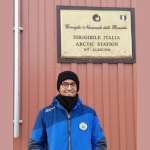 Graduated in Analysis and Management of the Environment from the University of Bologna, he began his collaboration with the Institute of Polar Sciences in 2019, conducting a study on identifying biomass burning events in Ny-Ålesund between 2010 and 2020. Currently a PhD student in Polar Sciences at Ca' Foscari University of Venice, he works at the ISP in Bologna. He mainly focuses on studying the optical and physical properties of atmospheric particulate matter, with a special focus on the Arctic region. He uses passive techniques like solar and lunar photometry, combining them with in-situ measurements of the scattering and absorption coefficients of solar radiation by aerosols.
Graduated in Analysis and Management of the Environment from the University of Bologna, he began his collaboration with the Institute of Polar Sciences in 2019, conducting a study on identifying biomass burning events in Ny-Ålesund between 2010 and 2020. Currently a PhD student in Polar Sciences at Ca' Foscari University of Venice, he works at the ISP in Bologna. He mainly focuses on studying the optical and physical properties of atmospheric particulate matter, with a special focus on the Arctic region. He uses passive techniques like solar and lunar photometry, combining them with in-situ measurements of the scattering and absorption coefficients of solar radiation by aerosols.
 Graduated in Chemistry in 1993, obtained a PhD in 1997, she has been a senior technologist at ISPRA since 2021 and a technologist since 2005. Specializing in the chemical contamination of freshwater and marine environments, sediments, and soil, over the years, she has carried out numerous activities, including chemical and ecotoxicological laboratory work aimed at developing analytical methodologies and environmental indicators. She has also been involved in fieldwork, including participation in four expeditions to Antarctica, two of which she coordinated the project personnel. Her activities also encompass training, processing and validating chemical data from environmental monitoring, and providing support to ministries and other entities.
Graduated in Chemistry in 1993, obtained a PhD in 1997, she has been a senior technologist at ISPRA since 2021 and a technologist since 2005. Specializing in the chemical contamination of freshwater and marine environments, sediments, and soil, over the years, she has carried out numerous activities, including chemical and ecotoxicological laboratory work aimed at developing analytical methodologies and environmental indicators. She has also been involved in fieldwork, including participation in four expeditions to Antarctica, two of which she coordinated the project personnel. Her activities also encompass training, processing and validating chemical data from environmental monitoring, and providing support to ministries and other entities.
Currently, she manages and participates in environmental research activities related to the management of chemical contamination and the diffusion processes of contaminants, in line with the institutional activities of the Institute. In recent years, she has provided technical-scientific support for activities related to the collection and organization of databases related to the monitoring of different types of water, to be transmitted at the European level (EIONET Soe). She is the national representative (NRC) for Marine, coastal, and maritime issues at the European Environment Agency.
In past years, she has provided technical-scientific support for reporting activities related to the Nitrates Directive, activities related to the management and reclamation of some Sites of National Interest, the IPPC/AIA Commission, and the VIA Commission. For about 20 years, she has been involved in polar environment research, starting during her academic years and continuing to the present. She currently coordinates a Collaboration Agreement with the British Antarctic Survey (BAS). She is involved in several national and international research projects and has produced more than 80 refereed and non-refereed scientific publications.
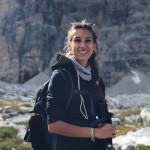 Environmental Scientist and PhD candidate in Polar Science, at Cà Foscari University of Venice.
Environmental Scientist and PhD candidate in Polar Science, at Cà Foscari University of Venice.
She graduated with a Bachelor's degree in Environmental Science and Technology from the University of Milano-Bicocca, interested in climate change, atmospheric chemistry and physics, driven by a desire to protect the Planet; she continued her studies, obtaining her MSc degree, with Honors, in Environmental Science and Technology from the University of Milano-Bicocca, with a thesis on paleoclimate reconstruction; studying eolian mineral dust trapped in the RICE, Antarctic ice core.
Currently a Ph.D. candidate in Polar Science at Cà Foscari University of Venice, with her research project she is working on atmospheric chemistry, studying the atmospheric heating rate in the Arctic due to Black Carbon, a crucial topic for the comprehension of the Arctic amplification phenomenon.
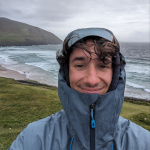 I am a Ph.D. candidate at the University of Milano-Bicocca in Milan, Italy.
I am a Ph.D. candidate at the University of Milano-Bicocca in Milan, Italy.
My background includes a bachelor's degree in Physics and Astrophysics from the University of Florence, followed by a master's degree in Physics of the Earth System at the University of Bologna.
My research focuses on snow and ice multispectral remote sensing, where I investigate the physical properties of the snowpack and the radiative effects that dust and algae have on it. Beyond my primary research, I am interested in drones, instrumentation, and atmospheric dynamics.
 Ministero dell'Universita e Ricerca
Ministero dell'Universita e Ricerca
Programma Ricerche Artico
Programma Nazionale di Ricerca in Antartide
 Ministero degli Affari Esteri e della Cooperazione Internazionale
Ministero degli Affari Esteri e della Cooperazione Internazionale
L'Italia e l’Artico
L’Italia e l’Antartide
CNR-ISP
National Research Council
Institute of Polar Sciences
c/o Scientific Campus - Ca' Foscari University Venice - Via Torino, 155 - 30172 VENEZIA MESTRE (VE)
Phone: +39 041 2348547 - E-mail: protocollo.isp AT pec.cnr.it
Fax: +39 041 2348 549 - Codice Fiscale: 80054330586 - P.I.:02118311006
Unless otherwise indicated, the content of this site is licensed : Attribution Non Commercial Share Alike 4.0 International (CC BY-NC-SA 4.0)
Privacy policy e Cookie policy - Transparent administration (CNR)








